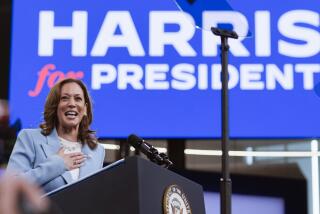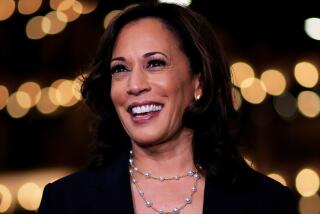POLITICAL BRIEFING
- Share via
MULTIPLE CHOICE: Top Democratic elected officials are being asked to back a scheme to take some of the edge off the early presidential primaries. The author of plan, North Carolina Sen. Terry Sanford, has long criticized the current nominating system as “chaotic, confusing and costly.” To inject a measure of substance into the process, he is proposing sort of a mini-convention of Democratic senators, House members and governors. They would gather in January, weeks before the delegate process officially gets under way, to scrutinize the candidates. Instead of debating each other, the contenders would appear one at a time before the assembled officials to answer questions about their positions.
The conclave would end with a straw ballot, in which the participants would be asked to vote for two or three candidates in the order of preference. “We’re not trying to pick a candidate,” Sanford says. “We just want to make sure the best candidates get the attention they deserve.”
Sanford claims to have gotten a favorable response from the leaders he has approached. But Democratic professionals see at least one problem. “Elected officials are never eager to get out in front of their own constituents back home,” says Paul Tully, Democratic Party political director.
SETTING THE DATE: Few of the potential candidates seem eager for the Democratic presidential race to start, but the first contests may be moving up anyway. Later this month, a Democratic National Committee rules panel meeting in Chicago is expected to vote not to penalize South Dakota for scheduling its 1992 primary on Feb. 25. If South Dakota cuts to the front of the line, New Hampshire--whose primary is now scheduled for that date--would move up its primary a week under state law. If New Hampshire moves up, Iowa--whose first-in-the-nation caucus is currently scheduled for Feb. 17--will also request permission from the DNC to jump forward a week.
These dominoes were set in motion earlier this year when the Republican-controlled South Dakota Legislature moved up the state primary to the February date--over the objections of Democrats who noted that national party rules prevent any state but Iowa and New Hampshire from selecting delegates before March 3. Because South Dakota would be in violation of party guidelines, the DNC could withhold 25% of its delegation to next year’s national convention. But the rules panel is unlikely to penalize the state party, insiders say, because Democrats in the Legislature made a good-faith effort to prevent the move.
THE TEXAS CONNECTION: Republican strategists looking ahead to their party’s 1996 presidential nominating campaign sat up and paid attention when they heard that political consultant Richard McBride will run the 1992 election campaign of California Sen. John Seymour. McBride has no campaign experience in California. What he does have, though, are close ties to Texas Sen. Phil Gramm, whose first Senate campaign he managed back in 1984. The connection has spawned speculation that McBride will use the Seymour campaign to survey the state for an anticipated Gramm presidential bid in 1996.
“Just what I’d do if I wanted to run for President,” said one California Republican of McBride’s hiring.
Another, less conspiratorial view is that the selection of McBride is simply a mutually beneficial arrangement. Washington neophyte Seymour gets connections on Capitol Hill, through McBride’s link to the influential Gramm, while Gramm gets credibility in the nation’s biggest state for one of his lieutenants.
More to Read
Get the L.A. Times Politics newsletter
Deeply reported insights into legislation, politics and policy from Sacramento, Washington and beyond. In your inbox twice per week.
You may occasionally receive promotional content from the Los Angeles Times.










